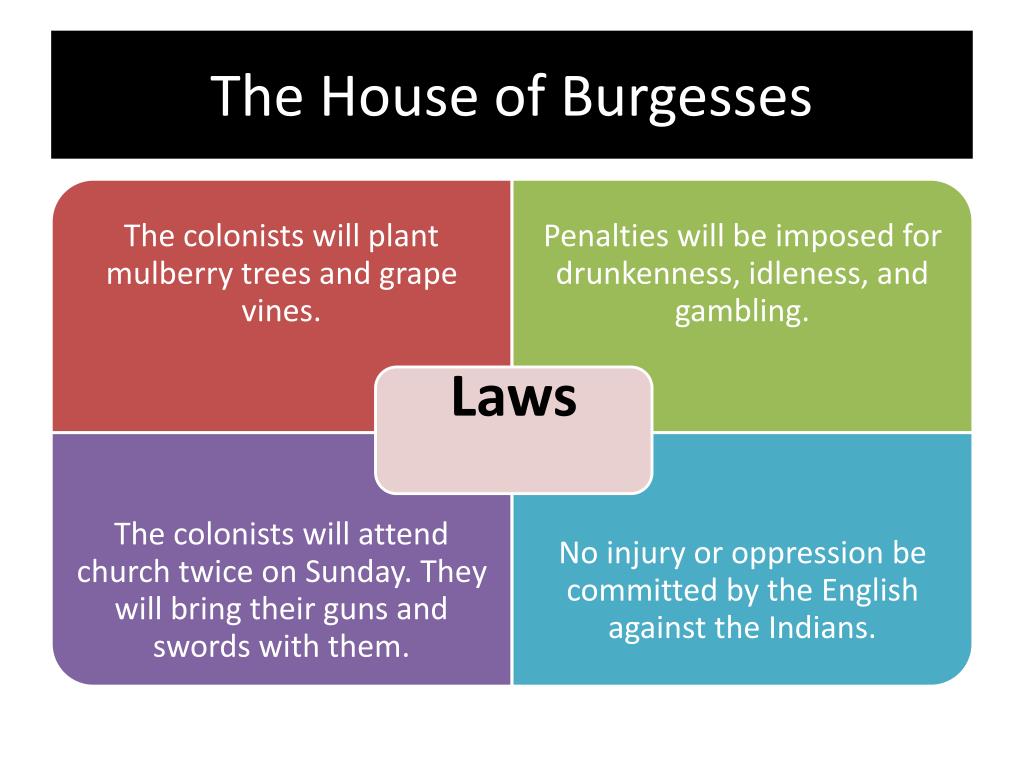Table Of Content

Throughout the 18th century, the House continued to meet, and began to see itself as a Parliamentary equivalent in Virginia. By unanimous vote, Martin was censured and ordered to appear before the legislature to give his side of the story. He was ordered to remit a certain amount to the assembly as security that neither he nor his people would molest the indigenous tribes or touch their property without consent in the future. He was not required, however, to seek permission from the governor for trade with natives which established policies regarding personal property in the colonies.
Increased Royal Regulation
Fearing that a lack of royal sanction might invalidate the laws of the assembly, place land titles under legal question, or even abolish the legislature altogether, the General Assembly sent representatives to England to seek official backing. King Charles I, who had succeeded James I on March 27, 1625, issued no ruling on the matter. The assembly met with its status unclear in 1625 and 1626; in 1627, the assembly received de facto recognition when the king asked the General Assembly to take part in regulating the tobacco trade.
Superb Owl Words

The House of Burgesses is important to United States history because it was the first elected representative government in Colonial America. Over time, it played a key role in the American Revolution, especially in resisting the Stamp Act and establishing permanent Committees of Correspondence. As the American Revolution intensified, members established the Virginia Conventions, which were responsible for declaring Virginia’s independence from Great Britain and introducing the Lee Resolution during the Second Continental Congress. The house of Burgesses was disbanded by Governor Lord Dunmore, in 1773, for revolutionary activities against the British monarch, he dissolved the legislature completely in 1774. As the House of Burgesses was prohibited from meeting, Patrick Henry delivered his famous speech “Give me liberty or give me death! Virginia was the first colony to teach its deputes to move for independence at the Continental Congress of 1776.
Henricus Colony of Virginia
On July 30, the House of Burgesses (an English word for “citizens”) convened for the first time. Its first law, which, like all of its laws, would have to be approved by the London Company, required tobacco to be sold for at least three shillings per pound. Other laws passed during its first six-day session included prohibitions against gambling, drunkenness and idleness, and a measure that made Sabbath observance mandatory. The burgesses continued to meet extra-legally in secret locations around Williamsburg, including the Raleigh Tavern, to discuss their next course of action. From these meetings came the Virginia Conventions, wherein many of the elected members were former burgesses.
Like the British House of Commons, the House of Burgesses granted supplies and originated laws, and the governor and council enjoyed the right of revision and veto as did the king and the House of Lords in England. The first law passed by the assembly during its first session was the regulation on the tobacco price to three shillings per pound. During the next six-day session laws were created on bans against gambling, drunkenness, idleness, and Sabbath observance was made compulsory. In May 1776 the House of Burgesses ceased to meet, and the Virginia Constitution of 1776 created a new General Assembly composed of an elected Senate and an elected House of Delegates. Landowners continued to elect representatives to the House of Delegates, two from each county and one from each city. Because the state constitution required that all bills originate in the House (permitting the Senate only to propose amendments), the lion’s share of political power in Virginia was lodged for the next seventy-five years in the House of Delegates.
The House of Burgesses was a superior school for statesmen, not only for those serving Virginia, but also for those serving the new United States. Peyton Randolph, the House of Burgesses’s last speaker, was the first president of the Continental Congress, and many of the Virginia representatives to Congress had experience as burgesses. George Washington, Thomas Jefferson, Richard Henry Lee, Patrick Henry, and other great revolutionary leaders of Virginia served first in the House of Burgesses, where they learned the skills that enabled them to lead in founding the new nation. The first elected assembly gathered in the House of Burgesses on July 30, 1619, in Jamestown. The House of Burgesses continued to meet annually, even after the dissolution of the Virginia Company in 1624 brought the colony under direct royal control. During the Stamp Act Crisis in 1765, the House of Burgesses played a critical role in opposing the British government’s attempt to enforce the Stamp Act.
In the mid-eighteenth century the House of Burgesses reemerged as the most influential branch of the colony’s government. In both cases, their agents enjoyed enough success to result in a compromise that reflected the House’s agenda. Thereafter, the House of Burgesses paid the salary and expenses of an agent in London, just as the governor’s Council did. From 1738 to 1766, John Robinson Jr. held the position of speaker and treasurer. Robinson’s knowledge of parliamentary procedure and long tenure enabled him, arguably, to wield more political power than any other man of his time.
With the governor now being a crown appointee, members of the House of Burgesses lost political power. Further, suspicion grew that as royal governors appointed burgesses to important posts, this would unfairly influence the activities of the House. The House attempted to pass legislation to enact a sort of checks and balances, whereby a Burgess appointed to an additional post by a royal governor was required to resign as burgess.
House of Burgesses · George Washington's Mount Vernon - Mount Vernon
House of Burgesses · George Washington's Mount Vernon.
Posted: Tue, 05 Jun 2018 11:42:04 GMT [source]
Later, in 1730, when Lieutenant Governor William Gooch proposed a new tobacco inspection law, the assembly enacted it and retained the provisions that prevented the executive from appointing burgesses in an attempt to increase his influence in the assembly. In March 1643 Wyatt’s successor, Governor Sir William Berkeley, authorized the burgesses to sit apart from the Council members as a separate chamber in a bicameral assembly. Berkeley had arrived in Virginia at a time when the king assumed a relatively hands-off posture toward the colony, and the new governor sought to promote a new class of leaders who shared his ambitions for economic diversification and continuation of trade with the Netherlands.
While Washington commanded the continental army in New York, about four hundred miles south in Williamsburg, the end of the House of Burgesses signaled the end of British political rule in Virginia. In 2019, Virginia celebrated the 400th anniversary of the first representative legislative assembly in North America. While the idea of representation has continued to be redefined over the course of America’s experiment in democracy, it is important to understand the origins of democratic assembly in the United States, and its birth in the Virginia House of Burgesses. Some scholars (Price among them) question whether these first Africans were treated as slaves and argue they were considered more along the lines of indentured servants. Evidence does suggest the presence of free blacks in colonial Jamestown and certainly, by 1676 CE, there were black landowners and at least one on record as owning black slaves himself. Even if the Africans were not treated as slaves, however, they arrived in that condition aboard a Dutch ship, which had captured them as cargo from a Spanish trader.
The assembly met in Jamestown until 1700, when meetings were moved to Williamsburg, the newly established capital of colonial Virginia. In 1624 the Crown revoked the Virginia Company’s charter; Virginia became a royal colony in 1625. The General Assembly continued to convene without any explicit royal authorization—the governor, Council, and burgesses unified by a drive for land and labor.
It remained the source of many political rebellions leading up to the War of Independence, the most prominent incidents being the Bacon’s Rebellion over increased taxes and corruption, which led to the Declaration of the People. When Patrick Henry was elected as a member of the Virginia House of Burgesses, he protested against the increased taxes especially the Stamp Act. On May 29, 1765, he delivered the famous ‘Caesar-Brutus Speech’ “If this be treason, make the most of it! ” against this act, which led to the establishment of the Sons of Liberty organization.

No comments:
Post a Comment